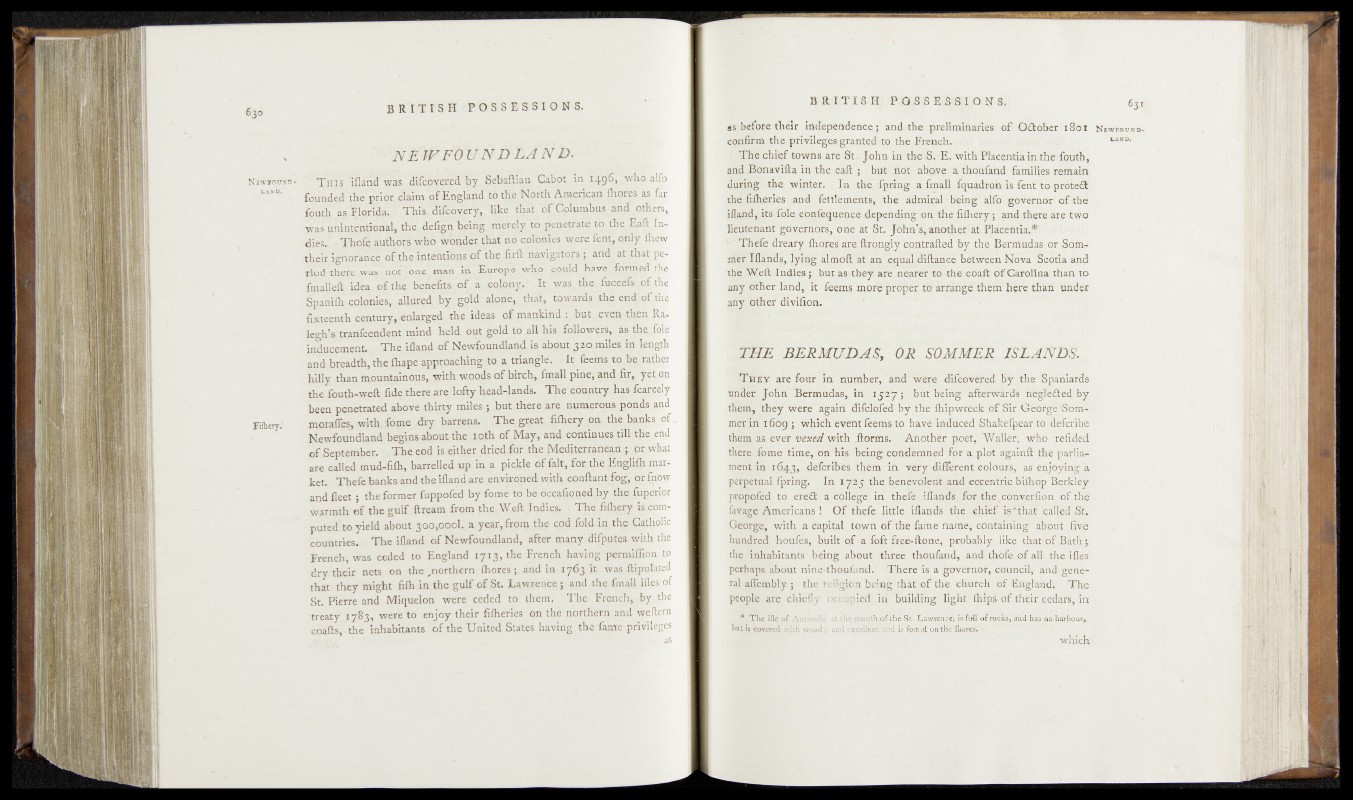
N e w io u s d
• -, X.AK 0.
FilheryJ
:ne wfo u n d la n d .
T h i s ifland was difcovered By Sebaftian Cabot in 1496, who alfo
founded the prior claim of England to the North American fliores as far
fouth as Florida. This difcovery, like that of Columbus and others,
was unintentional, the defign being merely to penetrate to the Eaft Indies.
Thofe authors who wonder that no colonies were font, only ftiew
their ignorance of the intentions of the firft navigators ; and at that period
there was not -one man in Europe who could have formed the
fmalleft idea of the benefits of a colony. It was the fuccefs of the
Spanifli colonies, allured by gold alone, that, towards the end' of the
fixteenth century, enlarged the ideas of mankind : but even then Ralegh’s
tranfcendent mind held out gold to all his fojlow'ers, asthe.g>le
inducement. The ifland of Newfoundland is about 320 miles in length
a n d breadth, the fliape approaching to a triangle, j It feems to .beyrather
hilly than tnnnntainmis, with woods of birch, fmall pi|i?,_and fir,j Jfet on
the fouth-weft fide, there are lofty head-lands. The country ,,l^^rcely
been penetrated above thirty miles ; but there .are .ijdttforo,us ponds |pd
morafleSj with Jfomc dry barrens. The grfat filhery on^lie hanks. cf
Newfoundland begfos about the 10th of May, and Q C ^ U f^ h th e jp
of September. The cod is either dried for the Mediterranean 4, |p|bat
are called mud-fifli, barrelled up in a pickje of falfe, for. the Eiagli«;x^ar^
ket. Thefe banks and the ifland are environed wit;!} cpnftant-TogV qr (|\ow
and fleet ; the former fuppofed by fotne to be occafioned by the fuperior
warmth e f the gulf ftream from the Weft Indies. The fifliery is computed
to yield about 300,000k a year, from the cod fold in the Catholic
countries. The ifland of Newfoundland, after many difputqs with the
French, was ceded to England 1713, the French- having permiffion to
dry their nets on the northern fliores'; and in 1763 it was ftipulated
that they might fifh in the gulf of St. Lawrence ; and the fmall ifles of
St. Pierre and Miquelon were ceded to them. The French, by the
treaty 1783, were to enjoy their filheries qn the northern and weftern
eoafts, the inhabitants of the United States having the fame privileges
as before their independence; and the1 preliminaries of October 1801 Ne-wfoum»-
confirm the privileges granted to the French. • ■ LAND*
The chief towns are St. John in-the ,'S. ‘E. with Plaeenria in the fouth,
and Bonavifea iq the eaft ; but dot abpjyc a thoufand falsifies remain
during the winter. In the fpring a fmall fquadroh is fen;t to protedfc
the fifoeries and fottlements, the admiral being Isrtfo'-governor ofthe
ifland,-its.fql.e, ebqfeqyenc^ depending on the fiiherys; prdvufore 'are two
lieutenant ffovejnb£s,foric at St. john’.s,.another’ at Placentia.*
• Thefe dreary Ib.ores’ ire flfcqngiy‘cqtvtrafted by the ‘Bermudas dr Sdip-*
mer Iflands, lying almoftat an equal^diftance between Nova Scotia and
the Weft 'Indies hut as- they: are nearer to the coaft' of Carolina than to
any other land, it Teems morb’‘prdp^f tfi; arrange them here than under
any^ other divifion.
TLIE BERMUDAS, OR SOMMER ISLANDS.
T h e y are four in number, aiid were diftbVefed by the'Spaniards
under John Bermudas, in 1527; but -being afterwards ffiglCded by
them, ifhey were again difolofed by the fhip wreck ,of Sir Geferge'!|Som-
mer in 1600 ; w’hich event feems to have induced Shake (pear tOsdcfcribe
theqTas ever vexed with .ftorms. Another poet, Waller, who refided
there Tome time, oft his being condemned for a plot again ft the parliament
iu 1643, deferrbes them in very difforent col0urs, as enjoying a
perpetual fpring. In 1725 the benevolent and, eccentric bilhjpp Berkley
propofed to eredt a college in thefe iflands Tor the ^enverfibn ^SEthe
favage Americans ! O f thefe little iflands the -chief is’’that called St,
George, with a capital town of the fame name, containing about five
hundred' houfes, built of a foft free-ftone, probably like that of Bath
the inhabitants being about three thoufand, and thofe of all the ifles
perhaps about nineUhoufand. There is a governor, council, and general
aflembly ; the religion being that of the church of England. THe
people are chiefly occupied in building light ftiips of their cedars, in
■ * The jfle of Anticoili, at the mouth of the St. Lawrence, is full of rocks, and has no harbour*
Pwh'.covered with wood5 and excellent cod is found on the ihores'. -
which'